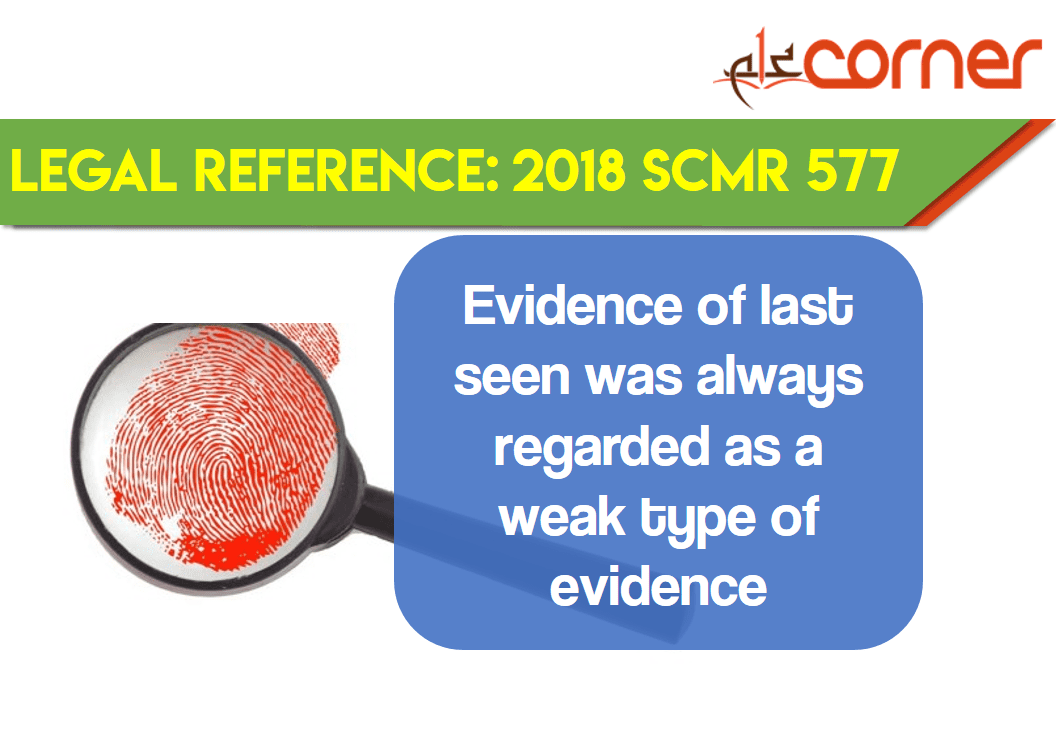2018 P Cr. L J 310
[Lahore]
Before Ch. Abdul Aziz, J
RANI BIBI—Appellant
Versus
The STATE—Respondent
(a) Penal Code (XLV of 1860)—
—-Ss. 302, 364, 201, 109, 148 & 149—Qatl-i-amd, kidnapping or abducting in order to murder, causing
disappearance of evidence of offence, or giving false information to screen offender, abetment, rioting
armed with deadly weapon, unlawful assembly—Appreciation of evidence—Benefit of doubt—Last
seen evidence—Scope—Accused were charged for the murder of brother of complainant—Prosecution
case revolved around the statement of two witnesses including complainant—Said witnesses appeared in
support of the evidence of last seen— Evidence of said witnesses showed that deceased was seen last
time alive in the company of accused and co-accused on 22.5.1998—Subsequently, neither any person
had seen the deceased alive nor heard about him—Record showed that the dead body of deceased was
recovered on 26.8.1998 at the pointation of co-accused persons from the house of the deceased—
Admittedly, at the time of recovery of the dead body of the deceased, neither the accused was present at
the crime scene nor made any such discloser—Prosecution case revealed that accused and her coaccused,
since acquitted, had made a disclosure on 2.9.1998 while in police custody and pointed out the
place of burial of the dead body of the deceased—Record transpired that accused was implicated in the
case with similarity of evidence with co-accused/mother, since acquitted, and the accused was convicted
on the same set of evidence—Accused persons who were implicated in a case with allegation of similar
nature, were entitled to same treatment—Complainant had alleged that deceased left his house in the
company of accused and her co-accused and subsequently went missing—Dead body of the deceased
was recovered later from the same house that too after about three months of the occurrence—Evidence
of last seen was very easy to knit but extremely difficult to prove—Said aspect of the case casted doubt
regarding the correctness of the claim of complainant and witness and rendered them unworthy of any
credence—Accused was acquitted in circumstances by setting aside conviction and sentences recorded
by the Trial Court.
Akhtar Ali and others v. The State 2008 SCMR 6 rel.
(b) Criminal trial—
—-Evidence—Last seen evidence—Scope—Evidence of last seen was always regarded as a weak type
of evidence—Such evidence itself was not sufficient to award conviction—In order to award or uphold
the conviction of a person on the basis of last seen evidence, the prosecution was required to place on
record some other piece of evidence which might provide sufficient corroboration—In the absence of
such corroboration, conviction could not be awarded solely on the basis of last seen evidence.
Altaf Hussain v. Fakhar Hussain and another 2008 SCMR 1103 rel.
(c) Penal Code (XLV of 1860)—
—-Ss. 302, 364, 201, 109, 148 & 149—Qanun-e-Shahadat (10 of 1984), Art. 129(g)—Qatl-i-amd,
kidnapping or abducting in order to murder, causing disappearance of evidence of offence, or giving
false information to screen offender, abetment, rioting armed with deadly weapon, unlawful assembly—
Withheld of best evidence—Appreciation of evidence—Motive—Proof—Motive for the occurrence as
alleged by the complainant was that co-accused/brother of accused was not happy with the marriage of
the deceased with the accused—Co-accused had openly expressed his resentment before two
witnesses—Complainant had also asserted that co-accused etc. had borrowed an amount of Rs.60,000/-
from deceased and on his demand, they were not returning the said amount—Due to which, even
accused was not happy with deceased—Two witnesses before whom co-accused had expressed his
resentment, were not produced before the court—Evidence of said two witnesses related to the motive
part of the prosecution case was withheld and that too without assigning any legal acceptable
explanation—In such circumstances, Adverse inference, in circumstances, could be drown as per Art.
129(g) of Qanun-e-Shahadat, 1984—Had the prosecution produced said witnesses, they would not have
supported its case—Complainant had admitted in his evidence that the marriage of deceased and
accused was solemnized with the blessing of the family members—Witness also stated in unequivocal
terms that co-accused had participated in the said marriage ceremony—Such features of the case,
reasonably reflected that prosecution case related to the motive part, had no scintilla of truth.
(d) Criminal trial—
—-Motive—Proof—Principle—Once the motive was alleged, the prosecution was obliged to prove the
same—Failure to do so would adversely affect the case of prosecution.
Noor Muhammad v. The State and another 2010 SCMR 97 rel.
(e) Penal Code (XLV of 1860)—
—-Ss. 302, 364, 201, 109, 148 & 149—Qanun-e-Shahadat (10 of 1984), Arts. 39 & 40—Appreciation
of evidence—Disclosure by accused—Admissibility—Statement of accused made in the custody of
police, was inadmissible under Art. 39 of the Qanun-e-Shahadat, 1984—In order to attract the provision
of Art. 40 of Qanun-e-Shahadat, 1984, prosecution was obliged to prove that the information given by
the accused led to the recovery of a fact which was not previously known to any body—Simple
statement of the accused regarding the fact which was already in the knowledge of the police or any
person did not fall within the purview of Art. 40 of Qanun-e-Shahadat, 1984 but under Art. 39 of the
Qanun-e-Shahdat, 1984.
Haji Muhammad Jan and another v. The State 2014 PCr.LJ 571 rel.
(f) Criminal trial—
—-Recording of evidence—Duty of Trial Court—Scope—Presiding Officer of the court, while
recording of evidence was obliged to bring on record only the evidence which was legally admissible—
Any objection raised either by the defence or by the prosecution regarding the admissibility of any
evidence was to be decided.
Asif Jameel and others v. The State 2003 MLD 676 rel.
(g) Penal Code (XLV of 1860)—
—-Ss. 302, 364, 201, 109, 148 & 149—Criminal Procedure Code (V of 1898), S. 342—Appreciation of
evidence—All the incriminating evidence were put to the accused while recording statement under S.
342 Cr.P.C.—Scope—Evidence, which was inadmissible in nature would not be put to the accused at the
time of recording his defence under S. 342, Cr.P.C.—Accused, facing the trial was not confronted with
such circumstances which were incriminating in nature, no conviction could be awarded on the basis
thereof.
